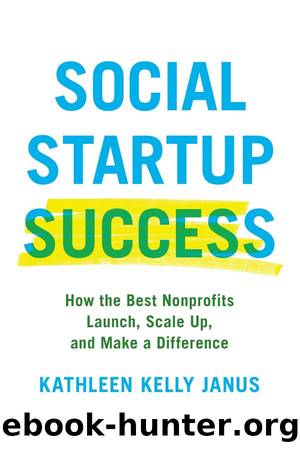Social Startup Success: How the Best Nonprofits Launch, Scale Up, and Make a Difference by Kathleen Kelly Janus

Author:Kathleen Kelly Janus [Janus, Kathleen Kelly]
Language: eng
Format: epub
Publisher: Da Capo Lifelong Books
Published: 2018-01-16T00:00:00+00:00
SHARE FUNDER INTRODUCTIONS
The challenges of formally collaborating with people at other organizations may not appeal to you, but you can still gain a great deal of assistance from them; leaders at peer nonprofits can be a font of valuable information regarding funders to pursue, personal introductions, and ideas for successful strategies they’ve employed. The range of funders is so vast, and their priorities differ so much, that organizations simply do not need to see each other as inherent competitors; they should feel free to share advice and connections. While those in the nonprofit sector involved in fundraising have learned very well that they have to make the “ask” to foundations and private donors, many are not optimizing the opportunities to ask one another for creative problem-solving assistance in pursuing grant money.
Correcting this omission is a goal of Natalie Bridgeman Fields, founder of Accountability Counsel. As a veteran Echoing Green fellow, having won a fellowship in 2009 that helped her start her organization, she has taught an Echoing Green workshop to incoming and seasoned fellows on the importance of maximizing peer relationships to help connect them to funders. She divides twenty-five classroom participants into groups of five based on the issue areas they support. She then tells them to look to their left, look to their right, and recognize that these are the people who are going to be their biggest fundraising allies. Fields then asks everyone to find a partner sharing issue overlap and have a discussion reviewing their current funders, exchanging their views of which might be good prospects for the other person, for example, if the funder is supporting a related aspect of their peer’s work. Following her example, as you do this, in addition to tapping your existing network of organization founders and staff, you can also check foundations’ portfolios to see if you know people at other funder organizations who may be good candidates for offering recommendations.
In her workshops, Fields encourages the fellows to limit their requests for introductions to one or two funders, to minimize the work they’re requesting, and that they include a brief explanation of why they think the funder would be a good fit. Note that such explanations may be the basis of a pitch template you can largely cut and paste into an email to the funder. Perhaps most important, those making the ask should always offer to reciprocate, and in fact be proactive in doing so. In cases where people demure, perhaps telling you they don’t feel comfortable recommending a funder, or that they have a delicate relationship with the funder you’re asking them to help connect with, it is important to respect their preference and not push them further.
Another method of building up a network of peer support is to create a team of peer executive directors in your issue area and meet with them once a month to compare notes about new funding opportunities, and successes and failures and creative approaches others have taken. Your current funders are
Download
This site does not store any files on its server. We only index and link to content provided by other sites. Please contact the content providers to delete copyright contents if any and email us, we'll remove relevant links or contents immediately.
Bad Blood by John Carreyrou(5769)
Principles: Life and Work by Ray Dalio(5322)
Rich Dad Poor Dad by Robert T. Kiyosaki(5149)
Management Strategies for the Cloud Revolution: How Cloud Computing Is Transforming Business and Why You Can't Afford to Be Left Behind by Charles Babcock(4131)
The Confidence Code by Katty Kay(3566)
Thinking in Bets by Annie Duke(3531)
American Kingpin by Nick Bilton(2970)
Playing to Win_ How Strategy Really Works by A.G. Lafley & Roger L. Martin(2953)
Delivering Happiness by Tony Hsieh(2922)
Project Animal Farm: An Accidental Journey into the Secret World of Farming and the Truth About Our Food by Sonia Faruqi(2661)
Brotopia by Emily Chang(2592)
I Live in the Future & Here's How It Works by Nick Bilton(2524)
Mastering Bitcoin: Programming the Open Blockchain by Andreas M. Antonopoulos(2511)
The Content Trap by Bharat Anand(2493)
The Power of Habit by Charles Duhigg(2489)
The Marketing Plan Handbook: Develop Big-Picture Marketing Plans for Pennies on the Dollar by Robert W. Bly(2414)
The Tyranny of Metrics by Jerry Z. Muller(2401)
Building a StoryBrand by Donald Miller(2360)
Applied Empathy by Michael Ventura(2329)
